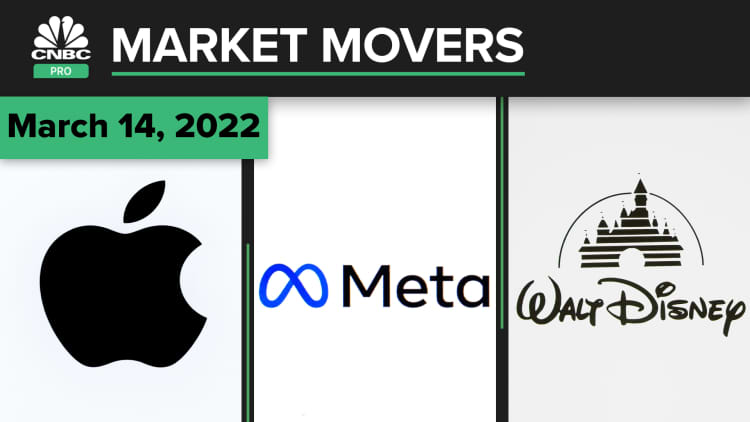
The S&P 500 fell on Monday to kick off an important week, as oil prices fell sharply and traders monitored the latest developments from the Ukraine-Russia war. Investors are also anticipating the first rate hike by the Federal Reserve this week.
The broad-market index fell 0.7% to 4,173.11, while the tech-heavy Nasdaq Composite slid 2.04% to 12,581.22. Both finished their seventh negative session in the past eight. Meanwhile, the Dow Jones Industrial Average finished flat, up about 1 point to 32,945.24, after climbing as much as 450 points earlier in the day.
"Investor sentiment is as bad as it gets. People have their positions and they're reluctant to sell out all together because they're hoping there'll be a pretty massive snapback rally," said Tom Martin, senior portfolio manager at Globalt Investments.
"The highs have been lower than the previous highs and the amount of breadth has just not been enough to carry the day," he added. "People are looking for an intermediate bottom to get some sort of rally on."
Wall Street kept an eye on the conflict between Russia and Ukraine, as the two countries resumed talks on Monday. A Ukrainian official said the country's objectives were to secure a ceasefire and an immediate withdrawal of Russian troops, along with other security guarantees.
Fighting has intensified around Ukraine's capital, Kyiv, while Russian forces bombard cities across the country, killing civilians who are unable to escape. The financial fallout of stiff Russian sanctions will come into sharper focus in the coming days ahead of a scheduled sovereign bond payment.
Apple, which was down 2.6%, was one of the top decliners in the Dow Monday. The company led tech stocks lower as a Covid-19 outbreak in China spurred concerns that pandemic restrictions could exacerbate the existing supply chain woes there. Intel and Salesforce fell 3.1% and 2.4%, respectively.
Qualcomm, one of the top decliners in the S&P 500, lost 7.2%. Chipmakers were lower across the board, with Marvell down 4.5% and Nvidia lower by 3.4%.
The moves also came as commodity prices, which had been surging recently amid the conflict, cooled off.
West Texas Intermediate crude settled about 5.7% lower at $103.01 per barrel, and Brent crude ended the day at $106.90, dropping 5.1%. During the session, WTI briefly dropped below $100, trading under that threshold for the first time since Feb. 24.
Loading chart...
Gold futures slipped 1.2% to $1,960.80 per ounce. Palladium dropped 13.5% to $2,417.60 per ounce for its worst day since March 13, 2020.
"The recent moves in a range of commodity prices are extreme, and if these moves hold for a prolonged period of time, the economic damage would be significant, but we still do not believe recession needs to be the base outcome, and do not see equities falling from current levels," JPMorgan strategist Mislav Matejka said in a note.
Shares of energy companies fell with oil prices. Devon Energy dropped 10.1% and Coterra Energy fell 9.7%. The Energy Select Sector SPDR Fund was lower by 2.9%.
Fed rate hike expected
Investors were also focused on the Fed, which is expected to raise its target fed funds rate by a quarter-percentage point from zero at the end of its two-day meeting Wednesday. Investors are also looking to the central bank for its new forecasts for rates, inflation and the economy, given the uncertainty from the escalated geopolitical tensions.
"At the moment, the Fed is expected to be cautious when it comes to interest rate policy in 2022, given the conflict in Ukraine," Lindsey Bell, chief markets and money strategist at Ally. "The conflict is adding complexity to the Fed's already difficult job. The central bank will likely remain data-dependent as it makes rate decisions throughout the year."
U.S. Treasury yields jumped to start the week, with the benchmark 10-year rate reaching its highest level since July 2019. That move gave stocks in the financials sector a lift.
American Express and Visa were among the Dow's top gainers, adding 2.9% and 1.8%, respectively.
Health-care stocks also rose after Shenzhen — a major city in a key manufacturing hub in China — shut down all nonessential businesses and imposed city-wide testing due to the Covid-19 outbreak.
The health-care sector gained nearly 0.7%, led by Moderna and Pfizer. Shares of Moderna gained 8.5%, and Pfizer advanced 3.9%


